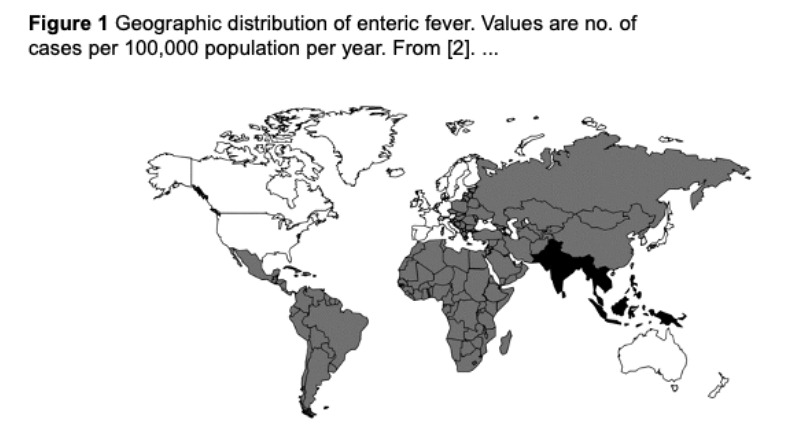Published on: December 23, 2020
For many people, the only time they’ve heard of typhoid has been in historical accounts of grim 1800s-era pioneers becoming infected on their way to the American west, or perhaps through the cautionary tale of Typhoid Mary, who refused to wash her hands, and spread typhoid through her cooking so frequently that she was banished to an island for the remainder of her life.
Despite this reputation, typhoid very much remains a threat today. While rare in industrialized countries, typhoid fever is a significant threat in some low-income countries and should be taken as a risk when traveling.
An Overview
Typhoid fever is a bacterial infection caused by Salmonella typhi. The only way to know if a person is ill with typhoid is to have their blood or feces tested for this bacterium.

Symptoms of typhoid are like those of other common gastrointestinal illnesses and usually develop one to three weeks after exposure to the bacteria. They range from mild to severe, and often include fever, headache, nausea, constipation or diarrhea, loss of appetite, and a rose-colored rash on the body.
Transmission is via the fecal-oral route, meaning that contaminated feces (and sometimes urine) may enter water supplies or food supplies, which may then be consumed by and infect others. Salmonella typhi lives only in humans; there is no animal reservoir for the bacteria.
It is estimated that worldwide there are up to 22 million new cases of typhoid fever and 200,000 deaths each year. Most cases are confined to the developing world, where the disease is endemic, with the greatest burden being in the Indian subcontinent and in Southeast Asia (figure below).
Regions with the highest incidence of typhoid fever (>100 cases per 100,000 persons per year) are south-central Asia and Southeast Asia. Regions of medium incidence (10–100 cases per 100,000 persons per year) include the rest of Asia, Africa, Latin America and the Caribbean, and Oceania, except for Australia and New Zealand. In Delhi, India, the incidence of typhoid fever is 9.8 cases per 1000 people per year.
Available Typhoid Vaccines and Vaccination Campaigns
Two typhoid vaccines are licensed for use in the United States; these are typically reserved for people traveling to areas where typhoid fever is common or for people who may come into direct contact with the disease.
Ty21a is a live, attenuated vaccine given in oral capsule form. Within the first two years of vaccination, the vaccine is moderately effective at preventing disease. Three years after initial vaccination, the vaccine offers no protection. The minimum age for this vaccine is six years.
Vi capsular polysaccharide (ViCPS) is an injected subunit vaccine. In clinical trials, it reduced disease rates by nearly 66%, though effectiveness wanes after several years. The minimum age for this vaccine is two years.
Other Methods of Protection
While vaccination at a traveler’s clinic is a highly effective method for preventing typhoid, avoiding exposure altogether is another essential measure. Typhoid spreads from contaminated food and water, so practicing the same precautions as you might to prevent foodborne illness can be effective.
Investigate the restaurants you may be visiting. Has there been any cases of typhoid in the area nearby? Do locals eat there? Contamination can occur if a chef does not wash their hands properly after using the restroom, so ensure the facilities offer such sanitation. Be sure to wash your own hands before your meal as well.
When it comes to food, a common mantra is “Cook it, peel it, or forget it”. Avoid fruits, vegetables, or other foods which are uncooked and cannot be peeled, and if you are eating hot food, be sure it is served to you steaming-hot. The high heat should have killed any bacteria in the meal.
Bottled water can also be a safer source than tap water, with bottled carbonated water being the safest. If you must drink tap water, boiling it for 1 minute should help kill any bacteria.
IDATB | Here to Help
International Traveler’s Clinic of Tampa Bay is here to help you with the pre-travel counseling and post-travel evaluations if you have travel planned in the upcoming future. They will assist you – from unique vaccinations to simple tips on how to protect your health and safety in a foreign country.





